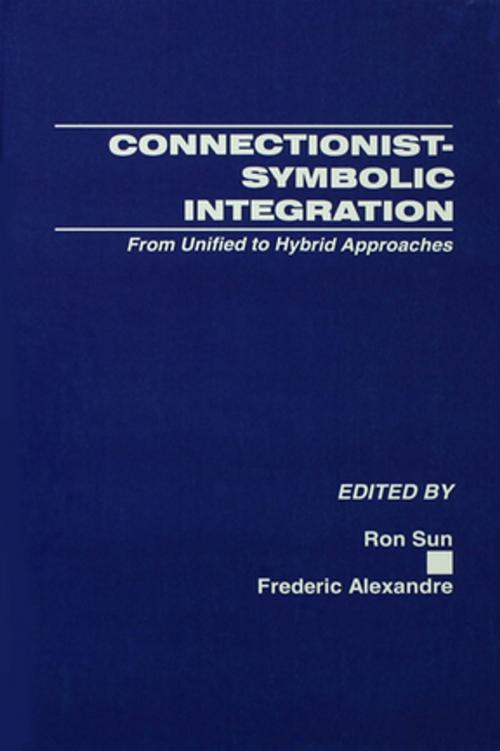Connectionist-Symbolic Integration
From Unified to Hybrid Approaches
Nonfiction, Health & Well Being, Psychology, Cognitive Psychology| Author: | ISBN: | 9781134802135 | |
| Publisher: | Taylor and Francis | Publication: | April 15, 2013 |
| Imprint: | Psychology Press | Language: | English |
| Author: | |
| ISBN: | 9781134802135 |
| Publisher: | Taylor and Francis |
| Publication: | April 15, 2013 |
| Imprint: | Psychology Press |
| Language: | English |
A variety of ideas, approaches, and techniques exist -- in terms of both architecture and learning -- and this abundance seems to lead to many exciting possibilities in terms of theoretical advances and application potentials. Despite the apparent diversity, there is clearly an underlying unifying theme: architectures that bring together symbolic and connectionist models to achieve a synthesis and synergy of the two different paradigms, and the learning and knowledge acquisition methods for developing such architectures. More effort needs to be extended to exploit the possibilities and opportunities in this area.
This book is the outgrowth of The IJCAI Workshop on Connectionist-Symbolic Integration: From Unified to Hybrid Approaches, held in conjunction with the fourteenth International Joint Conference on Artificial Intelligence (IJCAI '95). Featuring various presentations and discussions, this two-day workshop brought to light many new ideas, controversies, and syntheses which lead to the present volume.
This book is concerned with the development, analysis, and application of hybrid connectionist-symbolic models in artificial intelligence and cognitive science. Drawing contributions from a large international group of experts, it describes and compares a variety of models in this area. The types of models discussed cover a wide range of the evolving spectrum of hybrid models, thus serving as a well-balanced progress report on the state of the art. As such, this volume provides an information clearinghouse for various proposed approaches and models that share the common belief that connectionist and symbolic models can be usefully combined and integrated, and such integration may lead to significant advances in understanding intelligence.
A variety of ideas, approaches, and techniques exist -- in terms of both architecture and learning -- and this abundance seems to lead to many exciting possibilities in terms of theoretical advances and application potentials. Despite the apparent diversity, there is clearly an underlying unifying theme: architectures that bring together symbolic and connectionist models to achieve a synthesis and synergy of the two different paradigms, and the learning and knowledge acquisition methods for developing such architectures. More effort needs to be extended to exploit the possibilities and opportunities in this area.
This book is the outgrowth of The IJCAI Workshop on Connectionist-Symbolic Integration: From Unified to Hybrid Approaches, held in conjunction with the fourteenth International Joint Conference on Artificial Intelligence (IJCAI '95). Featuring various presentations and discussions, this two-day workshop brought to light many new ideas, controversies, and syntheses which lead to the present volume.
This book is concerned with the development, analysis, and application of hybrid connectionist-symbolic models in artificial intelligence and cognitive science. Drawing contributions from a large international group of experts, it describes and compares a variety of models in this area. The types of models discussed cover a wide range of the evolving spectrum of hybrid models, thus serving as a well-balanced progress report on the state of the art. As such, this volume provides an information clearinghouse for various proposed approaches and models that share the common belief that connectionist and symbolic models can be usefully combined and integrated, and such integration may lead to significant advances in understanding intelligence.















